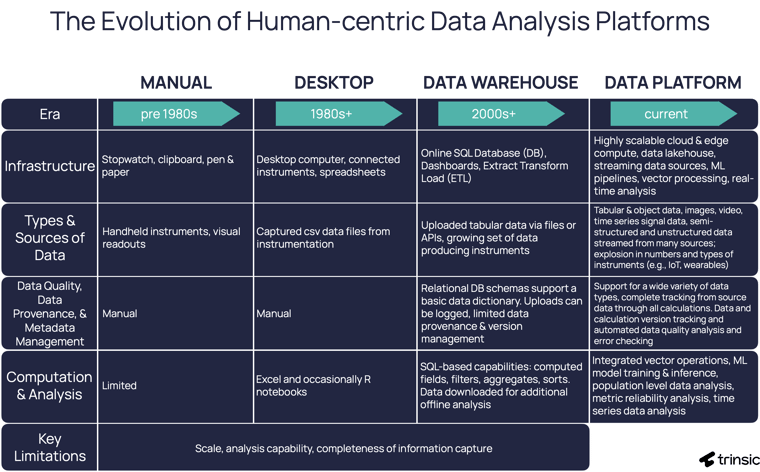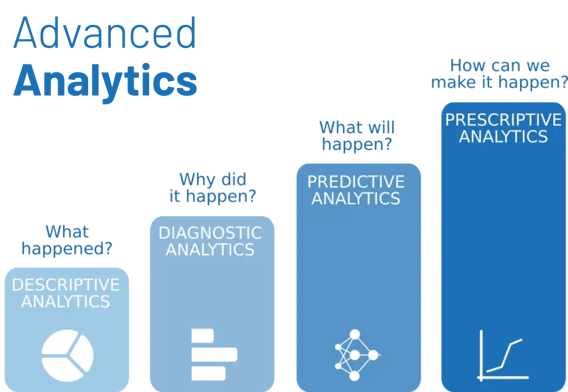What We'll Cover
- The evolution of data analytics from pen and paper to comprehensive data platforms.
- The differences between a data warehouse and a data platform.
- Limitations of niche data management solutions for a future-proof data strategy.
Read the summary
The journey from traditional Data Warehouses to modern Data Platforms has sparked a revolution with far-reaching implications for human-centric data intelligence and application in the rapidly evolving data management landscape. From tracking occupational health initiatives to enhancing athletic performance, from refining physical therapy techniques to shaping military readiness optimization, this transition to data platforms has paved the way for data-driven advancements that cater to the diverse needs of human well-being.
Data and technology are integrating into our lives with an increasingly measurable effect. The speed of this transformation makes it difficult to discern differences between data management systems and tools, as they all offer similarly vague promises of improved intelligence. However, underlying and supporting those promises is the genuine truth that big data is here to stay, and its impact will transform how we optimize human potential, health, and productivity.
"Every company has big data in its future, and every company will eventually be in the data business."
– Thomas H. Davenport, Academic and author specializing in analytics, business process innovation, and knowledge management
The image below provides a simple visual example of how the inherent value of human observation data has driven the continuous evolution of data science and data management infrastructures.

Data Warehouses: A Legacy of Limitations
Data warehouses, the stalwarts of the past, were designed to be centralized repositories for structured data. They excelled in capturing historical data and generating reports to facilitate business decision-making. However, these systems had their limitations. Data warehouses struggled when faced with the demands of
- unstructured data sources,
- real-time data processing,
- and scalability requirements.
Extracting insights from complex data ecosystems became increasingly challenging, inhibiting the potential for actionable real-time analysis.
The Rise of Data Platforms
Data platforms are holistic ecosystems that go beyond mere storage and analytics.
The paradigm shift to data platforms heralded a new era in data management. Rather than being confined to a single repository, data platforms encompass a comprehensive ecosystem of tools, technologies, and frameworks that facilitate end-to-end data processing, analysis, and storage. These platforms are designed to handle not only structured data but also unstructured and semi-structured data sources, enabling seamless data integration from a diverse array of origins. This flexibility empowers organizations to harness real-time data processing capabilities and make informed decisions swiftly.
The Power of Integration and Insights
The evolution from data warehouses to data platforms underscores the transformative potential of integration and actionable insights. In the context of human optimization, platforms enable a holistic overview of an individual's well-being, harmonizing data from diverse sources to create a comprehensive profile.
In the ever-evolving data management landscape, the transition from data warehouses to data platforms is nothing short of revolutionary. By employing artificial intelligence (AI) or machine learning capabilities, these platforms provide the intelligence to support data-driven decision-making.
- Comprehensive Assessment: By integrating data from wearable devices, electronic health records, functional assessments, subjective data, and more, data platforms enable holistic assessment, supporting proactive human optimization initiatives.
- Performance Optimization: Data platforms provide a unified platform for monitoring and improving performance, whether in athletics, operations, or personal development.
- Productivity Enhancement: Organizations leverage data platforms to optimize operations, identify bottlenecks and resource gaps, and enhance individual and team productivity.
Niche Data Management Solutions
While specialized data management systems have emerged within the broader ecosystem, the capabilities they provide are much more similar to data warehouses than comprehensive data platforms and suffer from similar shortcomings:
Fragmented Data: Niche systems often focus on specific data types or domains, leading to data fragmentation. Data platforms offer comprehensive integration across all data sources, providing a holistic view.
Limited Scalability and Flexibility: Niche systems may struggle to scale to accommodate evolving data needs and real-time intelligence. Data Platforms are designed to handle exponential data growth seamlessly. For example, they can easily add more servers, storage, or computing resources to accommodate increased data loads.
 Image credit: https://www.neuraldesigner.com/blog/what_is_advanced_analytics/
Image credit: https://www.neuraldesigner.com/blog/what_is_advanced_analytics/
Simplistic Intelligence: Basic visualization and calculation capabilities provide great value and utility in generating insights from small localized data. However, most niche systems aren't built on the technical foundation to support real-time analysis (e.g., edge computing) or advanced analytics like machine learning modeling.
Isolated Insights: Adopting these systems might provide valuable insights within their domain but lack the holistic view needed for informed decision-making across various interdisciplinary teams to underpin the shift to a data-driven culture.
Data Platforms: Bridge The Gap from Solutions to Systems
Data platforms are not just standalone solutions; they represent comprehensive systems that can support interdisciplinary decision-making and operations.
A solution is a singular tool or application that may have significant utility and value but is ultimately limited in its use. ChatGPT is the most relevant example of AI-powered technology, but it has limited application. A systems-based approach is necessary for organizations to truly harness the potential of big data and AI and gain relevant insights to answer specific questions and optimize their outcomes.
Enhanced Collaboration
Data platforms encourage collaboration among different teams and stakeholders by offering a centralized data access and analysis hub. This cross-domain approach uncovers valuable insights and connections that isolated point solutions can't achieve. This collaborative environment promotes knowledge sharing and synergy, resulting in more significant impacts on business outcomes.

Future-Ready Data Strategy
Data platforms are designed to effortlessly scale to accommodate growing data volumes and evolving business needs. They offer the flexibility to adapt to changing requirements, making them ideal for long-term strategic planning.
Iterative Improvement
Organizations can continuously refine their data analysis and strategies through iterative processes. This iterative approach, based on evolving data-driven insights, allows stakeholders to enhance operations and decision-making continuously. Over time, these improvements lead to incremental and sustained long-term impacts.
Take Home:
- The evolution from Data Warehouses to Data Platforms signifies a transformative shift in harnessing human-centric data.
- These platforms empower us to unlock the full potential of data, enabling better decision-making, breakthrough discoveries, and unprecedented achievements.
- The future is bright as we push the boundaries of what's possible through data-driven insights and actions.